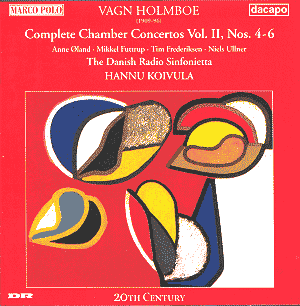|
Vagn HOLMBOE (1909-96) |
 |
In the series of four Marco Polo discs only the first volume (concertos 1-3) uses the Danish Radio Concert Orchestra. For volumes 2 to 4 the Danish Radio Sinfonietta is substituted. Going by a comparison of the programme notes this involves the same orchestra but playing under a different name. This is comparable with the re-brand 'transformation' effected by the BBC Northern Symphony Orchestra which became the BBC Philharmonic Orchestra during the mid-1970s.
The three-movement Piano Trio Concerto is in the manner of Martinu but this is the Martinu of the Parisian years where divertimento is the order of the day rather than grand tragedy. We can also catch resonances from Samuel Barber's Capricorn Concerto.
Holmboe's Viola Concerto is a work of dark elegies and meaty lyricism perhaps inevitably latching onto Paul Hindemith's inexplicably overlooked Schwanendreher Viola Concerto and the Bernard Herrmann music for The Nightdigger. The andante con moto is reflective, cool and at same time earnest as if dark business is in hand. It almost certainly typefies the times of the Nazi Occupation. All the chamber concertos from the Second to the Seventh were written during the Occupation. The vivace has an impressive sense of depth and the sharp intakes of breath from the strings at 2.37 are memorable.
The Violin Concerto is in three movements the first of which is a sturdy capricious fast-talking Andante-Allegro with a galumphing stride. The andante tranquillo can be thought of as a snowy Lark Ascending rising to heights of exaltation. The writing has the arctic heart of Holst's Four Medieval Songs for voice and violin - especially My heart hath nought but fire and ice. The concerto ends with the rough vigour of the finale of Vaughan Williams' Concerto Accademico.
We have heard the admirable Anne Øland (piano) and Mikkel Futtrup (violin) in volume 1. Neither Tim Frederiksen (viola) nor Niels Ullner (cello) disappoint.
Robert Barnett